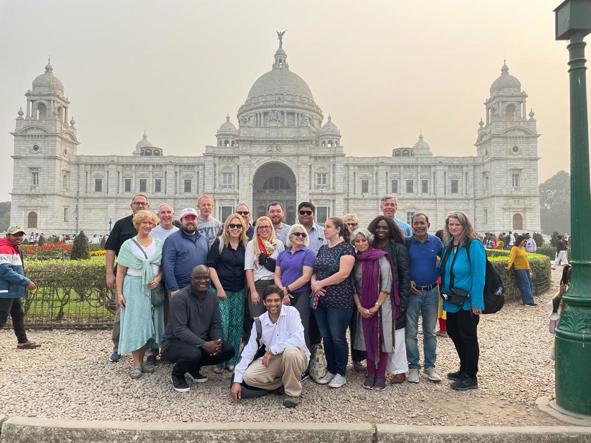 Traveling has always been a favorite activity for Dr. Nick Rhew, Assistant Professor of Management in the Romain College of Business. He’s been to more than 30 countries across the world and has visited nearly all 50 states. But his most recent trip wasn’t just for vacationing—it was an opportunity to learn and grow in the field of international business.
Traveling has always been a favorite activity for Dr. Nick Rhew, Assistant Professor of Management in the Romain College of Business. He’s been to more than 30 countries across the world and has visited nearly all 50 states. But his most recent trip wasn’t just for vacationing—it was an opportunity to learn and grow in the field of international business.
Rhew was one of a select few faculty from universities across the United States to participate in a visit to India from December 27 to January 10. The program was developed by Dr. Sumit Kundu, associate dean for the Center of International Business Education and Research at Florida International University nd sponsored by CIBERS from Brigham Young University and FIU. The trip included multiple stops to businesses and universities in several different cities and states across India.
“India is such an interesting place with a rich culture and history,” said Rhew, who was making his second visit to the country. “This time around, my whole focus was finding what I could use in my teaching and research. I was thrilled and grateful for the opportunity.”
The goal of the program is to equip faculty members with the ability to improve their teaching and research capabilities in international business. In this case, the focus was seeing how competitiveness looks in a large emerging market post-COVID. Just this past January, India passed China as the world’s most populous country with approximately 1.4 billion people.
Seeing that growth firsthand was something Rhew wanted to experience. As a professor of international business, it helped put an image to what he had shared with classes. By sharing his experience and the technological advances he saw firsthand, he also hopes it can put an end to the negative light that is sometimes shed on India in the United States. “It should tweak the thinking that India is a lesser country or so far behind – that can be the perception, especially in the U.S.,” Rhew said. “In terms of the level of income, there’s still a lot of development to happen. But there’s a portion that’s not at all behind and may even be ahead.”
 Rhew visited a variety of locations in India such as Delhi, Agra, Kolkata, Mumbai and Goa. There were trips to businesses such as Tata Motors–the parecompany for Jaguar Land Rover–and universities such as the Indian Institute of Foreign Trade and the Management Development Institute at Gurgaon.
Rhew visited a variety of locations in India such as Delhi, Agra, Kolkata, Mumbai and Goa. There were trips to businesses such as Tata Motors–the parecompany for Jaguar Land Rover–and universities such as the Indian Institute of Foreign Trade and the Management Development Institute at Gurgaon.
He even got a chance to present while at the Management Development Institute at Gurgaon as part of a mini conference. His presentation focused on the future of online education and what we have learned from COVID-19. While many classes went virtual during the pandemic, one major point of his presentation was that it isn’t always necessarily the best answer for every class to go that route.
“There are real differences between online and face-to-face programs,” Rhew said. “One lesson was certainly how we should deliver online programs better but hopefully another lesson was also when to choose not to go online.”
Rhew was able to almost immediately apply several lessons he learned from this program to classes he’s currently teaching this spring. At the undergrad level, he’s applied teachings to his strategic management courses. He’s also displayed hundreds of images that graphically demonstrate the lessons to make them more applicable.
He’s utilized the trip to improve his lessons in MGT 681, a Strategic and International Management course in USI’s MBA program. One component of the course is about entering foreign markets. In the past, many examples focused on Chinese markets. But after the visit to India, Rhew’s focus has shifted.

“It’s difficult to overstate just how influential India will be for the global economy,” Rhew said. “These lessons plug in so neatly to the section of the course that’s all about entering foreign markets.”
This program was an opportunity Rhew simply couldn’t pass up. He’s hopeful more ventures like this could show up in the future–whether it’s going back to India or exploring a new country.
He believes faculty, regardless of their concentration, should try something like this at some point during their teaching career. The lessons and experiences alone can prove to be extremely beneficial–but don’t expect them to just show up by traveling abroad. You have to make the most of it.
“Those benefits aren’t simply going to be automatic,” Rhew said. “You have to reflect on all of the differences and similarities. It has to be an active reflection to make good on the benefits of traveling internationally for a program that has cultural and academic visits.”